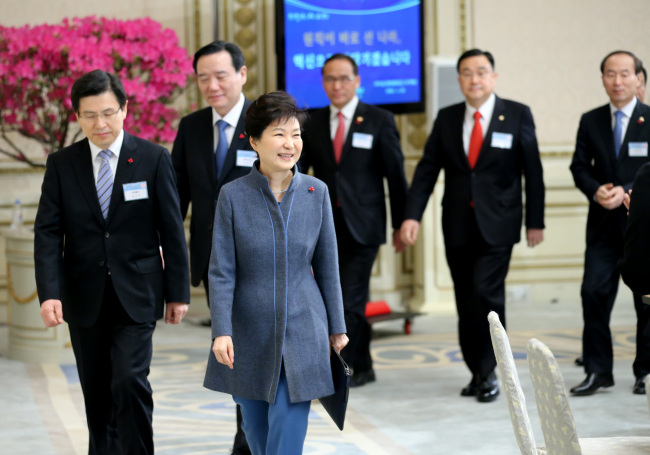President Park Geun-hye is considering visiting Iran amid growing concerns that South Korea is lagging behind its neighbors and other countries in courting the Islamic republic for economic cooperation after international sanctions were scrapped earlier this month.
“I understand that President Park is considering a visit to Iran,” Cheong Wa Dae spokesperson Jeong Yeon-guk told reporters. “I will give you details (about her potential visit) when everything is finalized.”
Should Park decide to go to Iran, she would become the first South Korean president to visit the resource-abundant Middle East state.

The move came as criticism is rising over the nation’s insufficient efforts to restore ties with Iran which boasts a lucrative market with a population of 80 million, for which China, Japan, Russia, Germany and other countries have beefed up diplomacy to advance their economic interests.
Chinese President Xi Jinping traveled to Tehran last Saturday, becoming the first international leader to visit Iran after the nuclear-related sanctions were lifted on Jan. 16. Beijing inked 17 agreements with Tehran for cooperation in energy, trade and other areas.
China is currently Iran’s largest trading partner with bilateral trade surpassing $50 billion in 2014, while the trade volume between Korea and Iran in the year dipped to $8.6 billion, less than half the trade volume recorded in 2011.
Japanese Prime Minister Shinzo Abe is also considering visiting Iran after its dispatch of a massive business delegation last year. Russian President Vladimir Putin visited Tehran last November to enhance economic ties with Iran.
Seoul has also been constantly seeking to bolster economic ties with Tehran, though critics argue that its efforts to restore ties have been inadequate.
Last June, Seoul’s then First Vice Minister Cho Tae-yong visited Iran to discuss bilateral cooperation. His visit was followed by Foreign Minister Yun Byung-se’s trip to the country last November, during which he met with Iranian President Hassan Rouhani. Yoo Il-ho, then land and transport minister, also visited Iran last August.
Seoul officials have expressed confidence in bolstering ties with Tehran, arguing that despite U.S.-led nuclear sanctions against Iran, South Korea has been struggling to maintain adequate bilateral economic relations.
However, observers say that Seoul should do more to keep up with other nations, and that it needs to craft a more sophisticated, long-term diplomatic strategy toward the Middle East and reduce its excessive diplomatic focus on Northeast Asia and the U.S.
“Seoul’s efforts are somewhat belated given that other nations have already been scurrying to court Tehran and boost their economic ties with it. But better late than never,” said Chang Byung-ock, an Iran expert at Hankuk University of Foreign Studies.
“Seoul should strengthen its summit diplomacy with Tehran and devise a long-term, stable strategy to deal with crucial Middle East partners rather than keep making quick-fix solutions all of a sudden, whenever something transpires.”
As part of its efforts to restore lost ground in the Iranian market, Seoul has been seeking to hold various consultations involving government officials, local banks and businesses.
On Wednesday, the Ministry of Land, Infrastructure and Transport held a meeting with bankers and entrepreneurs to discuss ways to support local businesses hoping to advance into Iran’s infrastructure construction market.
Seoul also plans to resume the bilateral minister-level economic cooperation panel meeting — suspended since 2006 due to economic sanctions — late next month or early March.
By Song Sang-ho (sshluck@heraldcorp.com)

